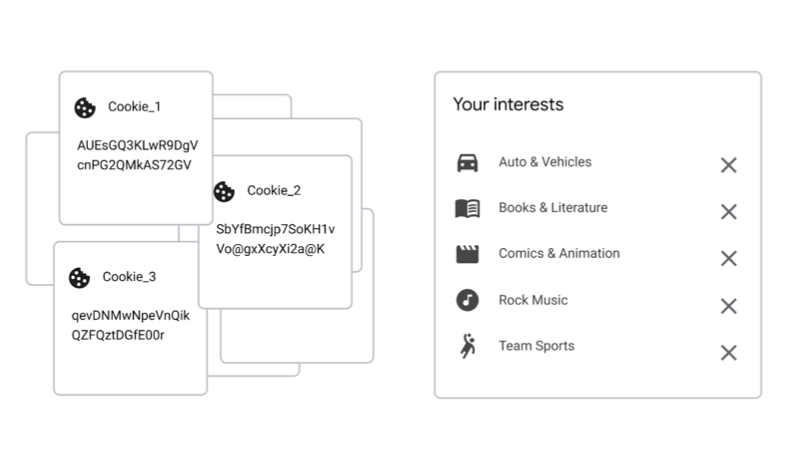Crunched: Google kills embattled FLoC, heralds 'Topics API' as next cookie replacement

“We are trying to design for this feature to be workable and usable globally, and we hope that regulators agree," Vinay Goel, Google's Privacy Sandbox Product Director, says.
Google's master plan to replace privacy-challenged browser cookies for user tracking and targeting with a troubled alternative, FLoC, has flopped. But the tech giant reckons “Topics”, its new user interest-based advertising initiative will fly. Publishers will need to opt in to Google's next iteration where online audiences will be sorted into up to five groups each week and advertisers can target audiences based on their interests.
What you need to know:
- Google has ended its experiment with cohort-based targeting, announcing the FLoC [Federated Learning of Cohorts] is dead and a new proposal, “Topics”, will take its place.
- Topics sorts users into up to five categories based on their week’s browser history. Advertisers can target Chrome users based on these topics.
- Vinay Goel, the Product Director of Google’s Privacy Sandbox, says the company hopes Topics will avoid the regulator pitfalls FLoCs fell into. It believes Topics is compliant with privacy laws like GDPR and CCPA.
- Publishers have to opt in to use Topics, and users will have the option to opt out – but it’s unclear how their experience will change if they do.
Google has shelved its cohort-based advertising plan known as Federated Learning of Cohorts, or FLoC, in favour of “Topics”, a new interest-based proposal to help advertisers after the end of third-party cookies on Chrome.
After months of headaches and headwinds for FLoC, including concerns it would be incompatible with Europe’s General Data Protection Regulation (GDPR), Google’s Privacy Sandbox has ended cohorts in favour of several hundred interest groups.
Google initially announced it would deprecate third-party cookies on its Chrome browser, which makes up roughly half of all users in Australia, at the end of 2021, but extended the deadline to late 2023 after it became clear the industry couldn’t agree to an alternative.
With Topics, a user’s Chrome browser will choose a handful of categories based on browsing history – “Fitness”, “Rock Music” or “Travel & Transportation”, for example – to share with websites and advertisers. Each user will be sorted into a maximum of five topics after each week of browsing, and one topic from each of the previous three weeks will be shared with an advertiser. Google says the entire process takes place on a user’s browser and device, not using any other servers, and is designed to thwart “fingerprinting” – where users are identified from unique signals and browsing characteristics.
Google says it believes Topics will stand more of a chance of being accepted by increasingly privacy-focused regulators.
“We’re actively working with regulators across the world, including those in the European Union,” Vinay Goel, Google’s Privacy Sandbox Product Director, said on a media call with Mi3.
“We are trying to design for this feature to be workable and usable globally, and we hope that regulators agree. We believe with the enhanced transparency and control help at that point.”

The initiative has chosen “a few hundred” topics for a list it will release in coming days that don’t verge into controversial territory, like gender, race and sexual orientation. A taxonomy of audience segments released by the IAB Tech Lab has previously been criticised for including items like income, religion, and political views.
Publishers will need to opt in to use Topics, which will be categorised by Google using the domain and subdomains of a website. The tech giant hopes Topics will form another signal advertisers can use to place ads.
“Websites need to opt in to Topics in order for them to contribute to the pool of potential topics that can be selected. That’s one part of the API,” Ben Galbraith, a Director of Web Platform Product Management at Google, said.
“We’re expecting advertisers to treat topics as an input into the process they use to select which ad to show. It may be that they choose to use a contextual signal for a given ad. It could be that they use another source of data, such as first party data.”
Users, meanwhile, can remove topics or disable the Topics API completely, but it’s unclear what impact that would have on a user’s ads.
Google says it ultimately doesn’t want to be responsible for the different Topics users can be sorted into.
“Our hope is that we can ultimately transition the selection and the curation of this to a third party who Is responsible to take feedback from all sides and really maintain this moving forward,” Galbraith said.
Other companies in the identity landscape have already begun to react to Google's proposal. Lotame's Chief Operating Officer, Mike Woosley, said the approach hearkens back to the contextual advertising techniques of 2005 and won't be enough to replace the cookie.
"Unfortunately, the technology as described would be grossly insufficient for the needs of the vast majority of modern marketers who require detailed personas to determine marketing voice, segment customers, measure brand affinity, and tune marketing for complex products like insurance with very detailed segmentations," he said in a statement.
"Even the difference between “Sports” and “Hockey” can be the difference between worthless and worthwhile for the digital marketer. The latter category might just be 3- to 4 per cent of the traffic in the former. Google could never survive relying on such basic tools for its vast empire of authenticated traffic, and to bequeath it to the rest of the world borders on insulting for most of the digital media industry."
The landscape after the death of the third-party cookie is still unclear, and brands, agencies and media companies are still experimenting with alternatives. Late last year, Mi3 published an in-depth report taking a look at the options and highlighting what 35 of Australia's sharpest minds believe will happen.
